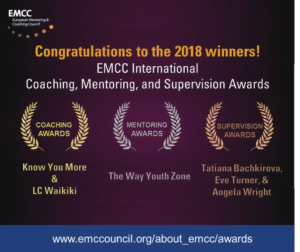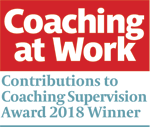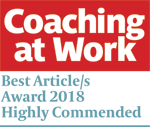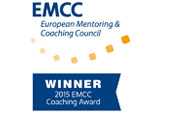2/3 May – Stepping out of Otherness and Supervision – Rita Symons
In this session, Rita will share some of the social psychology and themes from interviewing women of colour, and their experience of being ‘other’ (from her book “Stepping Out of Otherness” due out in 2024). We will consider how this might impact for coaches and what then we might need to consider as supervisors.
20/21 June – 2 different sessions: Thursday Show and Tell with Jeremy Lewis and Thea Bombeek; and Friday How Liberatory Coaching Principles Can Add Value to Coaching Supervision with DeBorah (Sunni) Smith
(June 20th) Show and Tell
1) Jeremy’s two research papers (published in 2023 and forthcoming in 2024) have conceptualised a framework that sets out how coaching supervisors might intentionally choose their interventions to meet their supervisees’ needs. Jeremy will present this framework and invite attendees to reflect on its potential uses in their own practice.
2) Thea: The dual process model of grief (Stroebe and Schut) is a holistic approach for coping with grief and loss. It moves away from previous grief models and theories, acknowledging individual experiences as different and unique. In this Show and Tell presentation, you will learn what the dual process model of grief is, how it works and how it can support you when accompanying bereaved clients.
The remaining time will be for others to share their own “show and tell” resources.
(June 21st) How Liberatory Coaching Principles Can Add Value to Coaching Supervision with DeBorah (Sunni) Smith
The session will explore how the Coaching for Transformation’s (CFT) approach to liberatory coaching decolonization can enrich the coaching supervision experience. Interactive small group sessions will introduce and expand on a case study that reflects a “lived experience” and coaching methodology for healing, justice, and liberation.
5/6 September – How far is your responsible Horizon? Let’s explore together the art of “Catedral Thinking” – Hellen Hettinga and Anna Casas
This is part of Kitchen Conversations 2024, a space of creativity, sharing, connection, being in relationship, intimacy, wisdom. We co-create a brave space to gather and to sense, reflect and dialogue together.v. These are casual conversations on topics that matter to us and are related to how we humans relate to each other, to the earth and to ourselves. Each invitation is framed around an inquiry or a topic . This session is about the relationship we have with the time horizon and the decisions we take individually and collectively in relation to it.
This Kitchen Conversations edition is inspired by the quote:
“When we build, let us think that we build forever.
Let it not be for the present delight,
not for present use alone;
Let it be such a work as our descendants will thank us for”
from John Ruskin and from the book “The Good Ancestor”, How to think long term in a short-term world, written by Roman Krznaric.
10/11 October – AI and Supervision: more details to follow – David Clutterbuck and Jonathan Passmore (Thursday) and David and Lise Lewis (Friday)
More details to follow
14/15 November – Loyalties at work: how the loyalty towards your family of origin influences professional choices and interaction patterns – Thea Bombeek
Your family of origin is your first context. This is where you get a blueprint of the important life themes. In this webinar you will discover how underlying processes and patterns of loyalty towards your family of origin manifest in your life. Increased awareness helps you to make conscious choices when dealing with professional challenges in a more constructive way. Living more in alignment with your essence, and at the same time staying loyal to your family, will create inner peace. Furthermore the insights you gain from this webinar will help you to address these themes with your clients.
5/6 December – Planning your own CPD with Doug Montgomery
This topic uses Doug’s recent personal experiences of a different style of Continuous Professional and Personal Development. This CPPD has been undertaken as part of a group of coaches and supervisors looking beyond the standard CPD offerings. The group adopted the name: Learning on the Edge (LOTE) and has involved us organising a series of 12 events (from horse whispering to Drag artistry) over the past couple of years. At different times these events have taken each of us to the edges of our comfort and at times into discomfort. However, supported by the group we have found our own learning and learned from each other’s experiences.
Doug will use this session to briefly share LOTE and then invite discussion and reflection on what is the purpose of CPPD for supervisors? What makes it CPPD? And, how do we integrate it into our supervision practice? Some of the group may attend and may offer their personal experiences and support Doug in the discussion.
Previous sessions:
12/13 January 2023 – Metavision: Cultivating wisdom with Dr Henry Campion.
Henry uses the term metavision as an alternative to ‘supervision of supervision’. In his work as a metavisor, he has found the idea of cultivating wisdom to be a valuable unifying concept, a map to navigate by, both for himself and for those he works with. The aim of this session will be to offer a model of wisdom, and then reflect together on what it takes to cultivate it and how far it overlaps with metavision.
2/3 February 2023 – Embodied supervision: Restoring together a movement of life and resilience with Anne Berthelin.
At a time when current events (pandemic, war, etc.) encourage distanced contacts and relationships, people are tired and exhausted, especially we supervisors as we are accompanying others. We need to cope with the environment and hold the complexity.
Anne will share a restorative process aimed at engaging us with our whole body and restoring our movement of life and resilience, using a mix of Narrative Practices and Gestalt to reincorporate, bring to life and maybe amplify our movement of Preferred Story. Anne created this process to support her clients (patients, coachees and supervisees) as well as in organisations over the past 3 years.
23/24 March 2023 – The supervisor’s role in developing an ethical exit strategy for unexpected incapacitation and death with David Lane and Eve Turner.
Many people don’t have a personal will, so even fewer may have a professional “will” or arrangements in case of their unexpected illness or death. While this would enable a clearer process for those we leave behind reducing much of the burden, would someone know how to access our client, Facebook, LinkedIn, professional insurance, professional body memberships and other information? Using real situations where this has arisen, some information and breakouts, this session will consider a coach’s and a supervisor’s ethical obligations.
13/14 April 2023 – Join the ReCreation Party – You’re invited! with Gillian Walter
You are invited to an experiential ‘party’ where you will explore how recreation (or light & full-hearted play) and creation (hands-on creativity) can support the connection to your own best self and thinking about how to bring more ‘ReCreation’ insights into your own client sessions.
11/12 May 2023 – Taking a systemic perspective on SoS/tricky cases with Tammy Turner
This experiential session will challenge you to expand your capacity in handling tricky cases and what’s required for the future of supervision. We will look at what is required as professional supervisors to work with cases that range from the student learning individual coaching to the advanced coach working in a complex adaptive system (CAS). A dynamic new model Spiralling the field to develop reflexivity will be introduced and explored against your tricky cases.
22/23 June 2023:
Thursday – Decolonizing and Liberatory Coaching Principles Applied in Coaching Supervision – DeBorah (Sunni) Smith
The session will explore how the Coaching for Transformation’s (CFT) approach to decolonizing and liberatory coaching principles can enrich the coaching supervision experience. Interactive small group sessions will introduce and expand on an established and “lived-experience” coaching methodology for healing, justice, and liberation.
Friday – A Decolonial Take on Ethical Maturity – Charmaine Roche
This session will explore the shift required for supervision to play a meaningful role in what is emerging as a social justice orientation in coaching. It will focus in on the place of critical reflection and radical compassion as underdeveloped attributes of ethical maturity. You will gain some insight into what these concepts might mean for you as a supervisor of coaches with aspirations to make a difference in relation to climate and social justice intent.
6/7 July 2023 – Let’s fall (and fail) together – Robin Shohet
Hafiz writes:
Pulling the chair
From beneath your mind
And watching you
Fall upon God
What else is there for Hafiz to do
Which is any fun
In this world
What is it that you would least like to find out or acknowledge about yourself? That might be the way to fall upon whatever you wish to call God. You might like to watch on the BBC iPlayer (if you have access) Humza Arshad, the comedian and YouTuber talking of “Forgiving the Unforgivable” if you have time. It throws up, as does forgiveness generally, our conflicts about letting go. https://www.bbc.co.uk/iplayer/episodes/m001hhr8/humza-forgiving-the-unforgivable) or if no access read about it here: https://www.bbc.co.uk/programmes/m001hhr8 . You could also read Anita Sanchez’s beautiful book “Four Sacred Gifts,” gifts delivered by a gathering of 27 First Nations Elders. One is called: “Forgive the Unforgivable.” Anita, a coach, tells her story of the murder of her father.
31 August/1 September 2023 – Kitchen Conversations – being in dialogue with ourselves and others, with music and movement – Anna Casas and Hellen Hettinga from the GSN Subgroup “supervision and reflective practice in the face of a climate and ecological emergency”
Sparked by Jeremy Lent in his book The Web of Meaning:
“As our civilization careens toward climate breakdown, ecological destruction, and gaping inequality, people are losing their existential moorings. The dominant worldview of disconnection, which tells us we are split between mind and body, separate from each other, and at odds with the natural world, has been invalidated by modern science.”
This special edition of the Kitchen Conversations invites you to join us integrating our connection between mind and body. It will be an experiential session, being in dialogue with ourselves and others. Not through verbal language, but through our bodies’ intelligence guided by the music rhythms. Using a meditation practice in movement, without choreography, we will engage in a spontaneous movement practice following the rhythms of the music.
It is an experiment to explore knowing beyond the cognitive, discover a creative expression of our essence, so we can tap into fresh, emergent ways of knowing that integrate learning on an individual and collective level through the improvised movements. Through sensing the rhythms of the music, we develop our presence and resilience, learn to be comfortable with not-knowing and allow deeper connections. This practice will serve practitioners and their stakeholders in developing awareness and an authentic curiosity in ‘who are you?’
21/22 September 2023 – Ethics in Coaching Promotion – with Francine Campone (Thursday) and Alex van Oostveen (Friday)
This interactive session will help coaching supervisors notice potential ethical challenges in coach promotional activities and consider blind spots, cognitive biases and errors in ethical judgement in coach self-presentation.
12/13 October 2023 – Team Coaching Supervision; Same or Different? – Anna Springett and Larissa Thurlow (Thursday), Cheryl Cooper and Larissa Thurlow (Friday)
Anna, Larissa and Cheryl have partnered to invite the network to co-reflect on an important question of how to best support team coaches in supervision. How are we already equipped and what else may we need to consider in order to be fit for this role/purpose?
9/10 November 2023 – Working with Context: Listening to a new voice – Bev Paulin
Contextual perspectives are not new in human-centred and developmental theory or practices. However, the call to acknowledge and honour context seems to be growing louder, broader, and deeper across coaching and supervision. This dialogue will be open, spacious, and undoubtedly enriched by the voices and presence of those gathered. It will be an opportunity to explore contextual dynamics in practice. It is an invitation to listen to a new voice.
30 November/Friday 1 December 2023 – EXTRA SESSION Invitation Guest speaker: Elaine Patterson – Enlisting Wisdom’s Wisdom for Planet Earth
An update from the GSN subgroup Supervision and Reflective Practice in the face of a Climate and Ecological Emergency.
7/8 December 2023 – Celebrating supervision – bring your stories, chaired by Robert Stephenson
Further details to be added. This will mark the end of the GSN’s 8th year (we started at the beginning of 2016).
1/2 February – The future role of Supervision in transforming Coaching and Human Consciousness –Professor Peter Hawkins.
At the route of all of the great global challenges of our time is inability of current human consciousness to respond to the world we have created. Coaching consultancy and supervision all have a key role in the maturation of human consciousness at the individual team, organisational and partnership levels. Peter will introduce some of the key approaches from his new book ‘Beauty in Leadership and Coaching and the Transformation of Human Consciousness’.
22/23 February – What every supervisor needs to know about working with neurodivergent clients in the workplace – Dr Francoise Orlov and Professor David Clutterbuck
Neurodiversity covers a wide range of divergent forms of thinking and being. A major advancement in the past decade had been the increasing recognition that neurodivergence is a difference, not a disability. Supervisors need to be well-informed and skilled in two ways that are relevant to this emerging understanding. One is how neurotypical coaches can best work with neurodivergent clients and how those clients interact with the systems around them. The other is how neurodivergent coaches can make effective use of the difference of perspective that they bring to their practice. They will share some of the themes emerging from their research with neurodivergent coaches and supervisors internationally.
7/8 March – Creativity in Supervision PoYee Dorrian (Thursday) and Jane Cox (Friday)
These sessions are deliberately different and, staying true to the essence of creativity, the two facilitators will each take their own creative approaches to inspire creativity. The sessions are designed to be exploratory and experiential, offering the participants an opportunity to play, activate, and integrate their inherent creativity into their supervisory practice. By adapting an inside-out approach in the sessions, participants will engage in various activities that encourage self-discovery and self-expression.
11/12 April – Communities of Practice: Ecosystems Supervision Groups – Hetty Einzig and Martin Vogel
We have been convening ecosystems supervision groups since 2020 – in person and online. We focus in depth on the individual and in breadth on the systems and networks in which our supervisees and their clients are located. Our approach encourages an integration of our identities as people, practitioners and citizens.
The recent United Nations Human Development report talks of a ‘new Uncertainty Complex’ where in addition to ‘normal everyday worry’ three particular areas of concern overlap: the accelerated rise of AI and other new technologies; our rising anxieties about the climate crisis and environmental collapse; the catastrophic geo-political polarisations, not just in the Middle East and Ukraine, but within our own fracturing institutions and societies.
We work within these circumstances, they form our wider ecosystem, and the concerns they raise are shared by us and our clients alike. The accumulation of ‘outsize’ and complex problems can engender a sense of impotence, anxiety and confusion that can transfer onto our individual concerns.
Our ecosystems supervision groups reflect on the impact of these developments on ourselves, our clients and our work. They answer the need for a space to explore our thoughts and feelings in the context of the many cultural and natural ecosystems of which we are part – home, family, workplaces, communities, nation and world. The group enables us all to also challenge our conscious and unconscious norms, assumptions and behaviours.

 GSN members include supervisors working in countries such as the USA, Canada, Brazil, Mexico, Australia, New Zealand, South Africa, Kenya, China, Hong Kong, South Korea, Vietnam, Singapore, India, Oman, Qatar and Turkey, as well as throughout Europe such as Spain, Poland, Portugal, France, Finland, Hungary, Germany, Latvia, Austria, Luxembourg, The Netherlands, Belgium, Ireland, Italy, Sweden, Switzerland and the UK. The GSN has established a community that brings together some of the leading thinkers in the field. To date there have been 220+ webinars.
GSN members include supervisors working in countries such as the USA, Canada, Brazil, Mexico, Australia, New Zealand, South Africa, Kenya, China, Hong Kong, South Korea, Vietnam, Singapore, India, Oman, Qatar and Turkey, as well as throughout Europe such as Spain, Poland, Portugal, France, Finland, Hungary, Germany, Latvia, Austria, Luxembourg, The Netherlands, Belgium, Ireland, Italy, Sweden, Switzerland and the UK. The GSN has established a community that brings together some of the leading thinkers in the field. To date there have been 220+ webinars. The Global Supervisors’ Network is proud to have partnered with EthicalCoach, the philanthropic arm of WBECS (now part of coaching.com), to support aspiring coaches in Africa with supervision. GSN supervisors have also supported CoachActivism which helps frontline refugee workers and individual volunteers.
The Global Supervisors’ Network is proud to have partnered with EthicalCoach, the philanthropic arm of WBECS (now part of coaching.com), to support aspiring coaches in Africa with supervision. GSN supervisors have also supported CoachActivism which helps frontline refugee workers and individual volunteers.

















